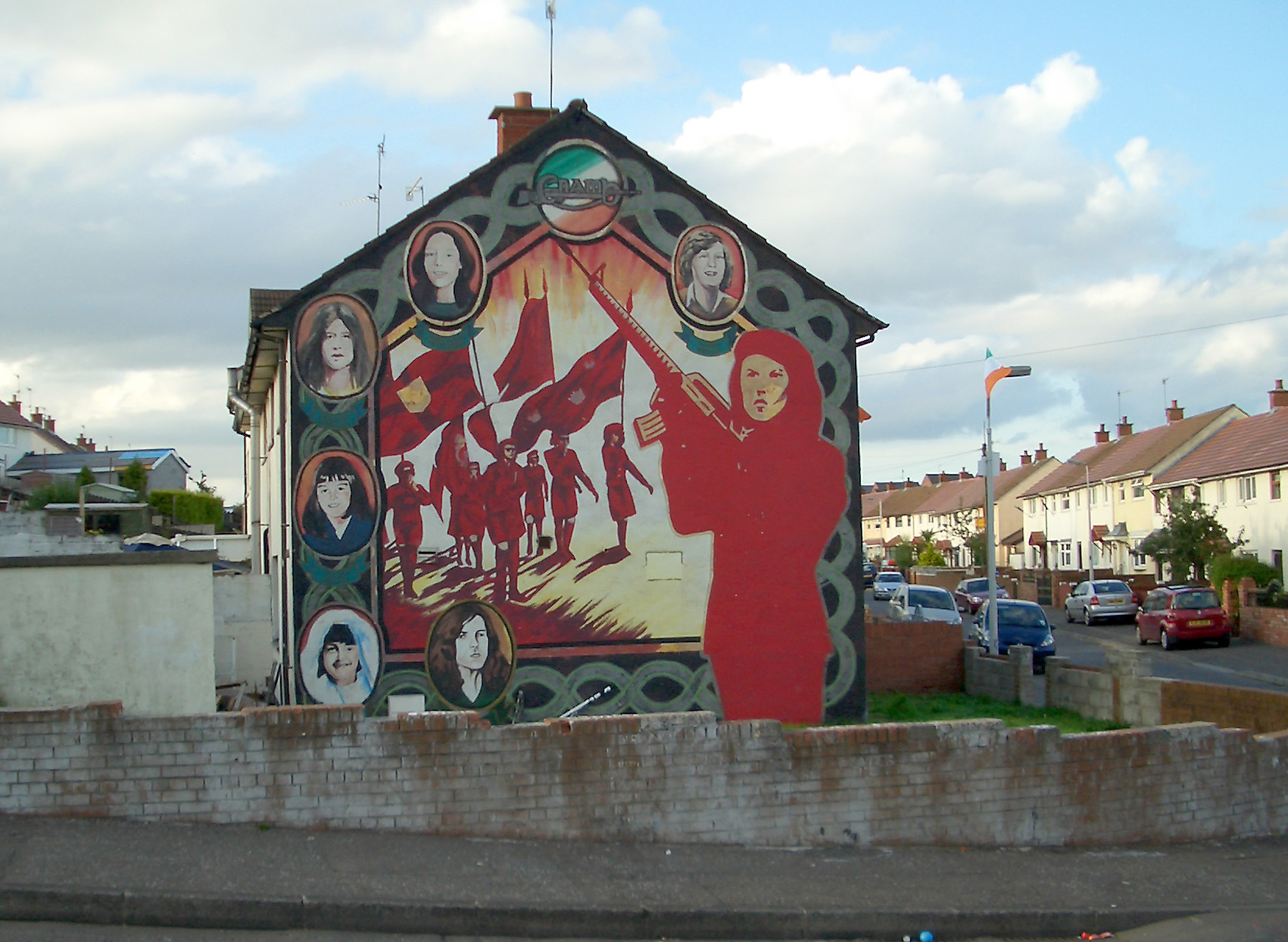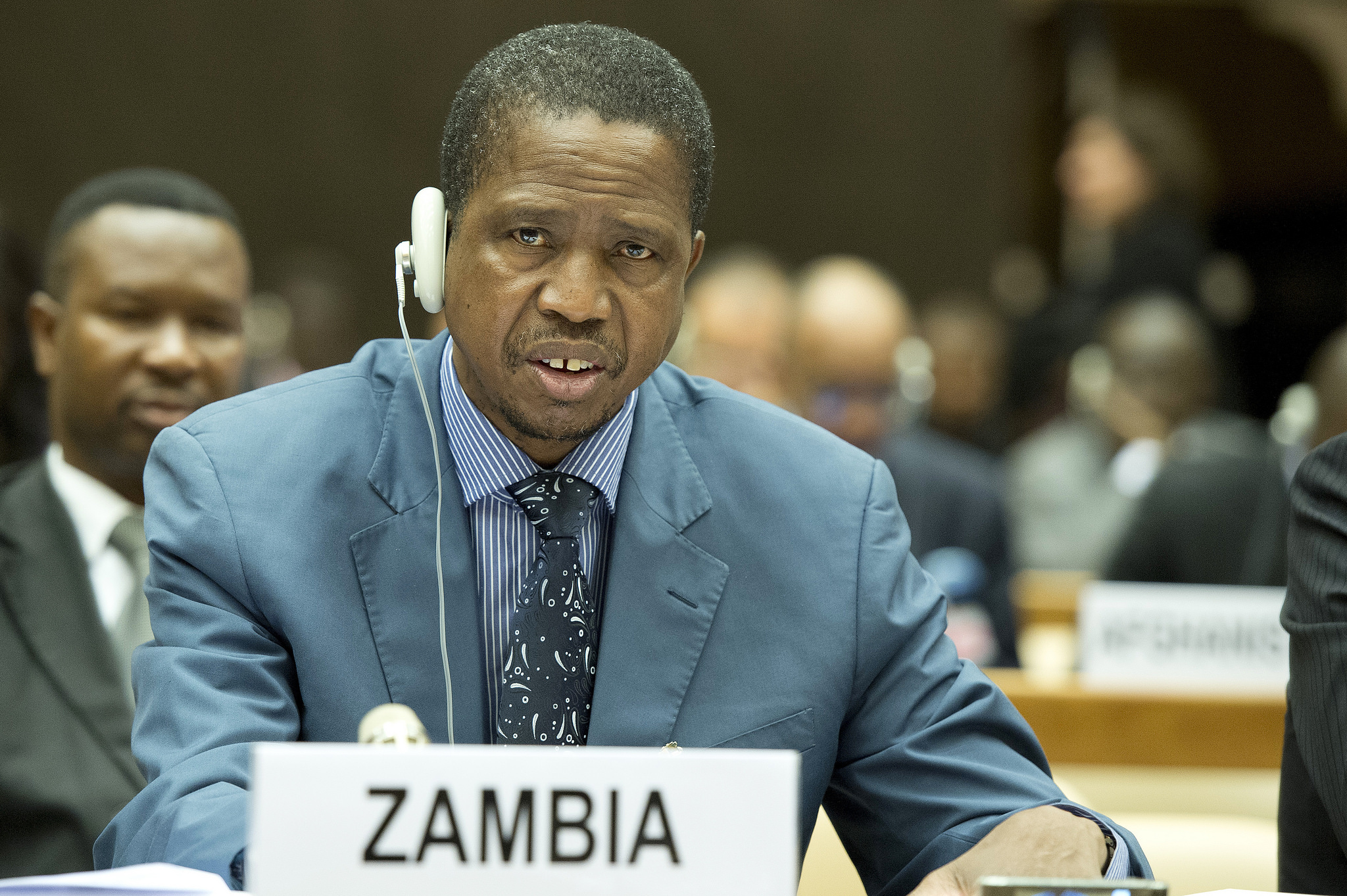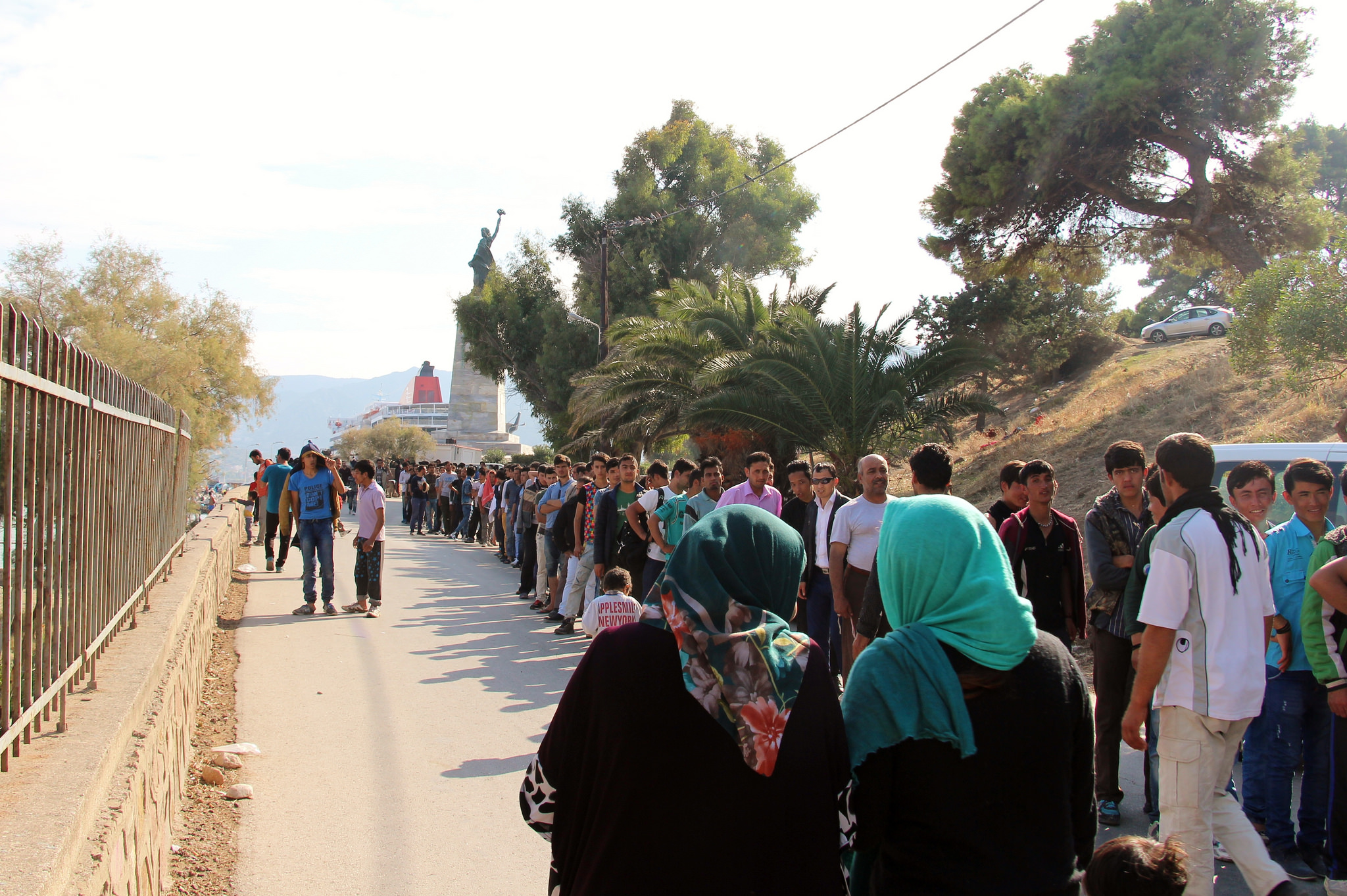Guest post by Sabine Carey, Marcela Ibáñez, and Eline Drury Løvlien
On April 10, 1998, various political parties in Northern Ireland, Great Britain, and the Republic of Ireland signed a peace deal ending decades of violent conflict. Twenty-five years later, the Good Friday Agreement remains an example of complex but successful peace negotiations that ended the conflict era known as The Troubles.
Since the agreement, Northern Ireland has experienced a sharp decline in violence. But sectarian divisions continue as a constant feature in everyday life. Peace walls remain in many cities, separating predominantly Catholic nationalists from predominantly Protestant unionist and loyalist neighborhoods. Brexit and the Northern Ireland protocol increased tensions between the previously warring communities, leading to an upsurge in sectarian violence, which has been a great cause of concern.
In March 2022, we conducted an online survey to understand attitudes toward sectarianism among Northern Ireland’s adult population. Our results show that sectarianism continues to impact perceptions and attitudes in Northern Ireland. The continued presence of paramilitaries is still a divisive issue that follows not just sectarian lines but also has a strong gender component.
How prevalent are sectarian identities in Northern Ireland today?
Our findings show that the pattern of who identifies as Unionist or Nationalist closely resembles the patterns of who reports having a Protestant or Catholic background. Unionists prefer a closer political union with Great Britain and are predominantly Protestant, Nationalists are overwhelmingly Catholic and are in favor of joining the Republic of Ireland.
Catholic and Nationalist identities appear to have a greater salience for the post-agreement generations than for older generations who lived through the Troubles. For Protestant and Unionist respondents, the opposite is the case, as religious background and community affiliation have a higher salience among older groups, particularly among men. Among the adults we surveyed, for men the modal age of those identifying as Unionists is 58 years, for women it is 46.
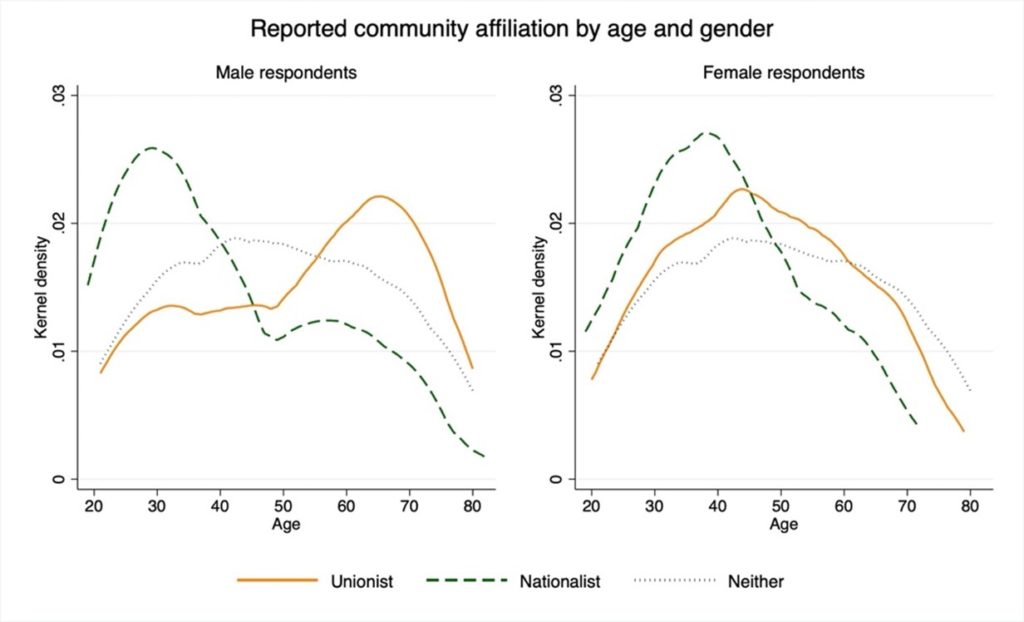
Economic fears or security concerns—what is seen as the most significant problem facing Northern Ireland today?
When asked about the greatest problem facing Northern Ireland today, sectarianism still features strongly among both communities. Today, the fault lines of the conflict seem to resonate more with those from a Catholic background than with those from a Protestant background. While Protestants were predominantly concerned with poverty and crime, among Catholics sectarianism emerged most often as the greatest concern. Just over 50 percent of Catholic respondents mentioned an aspect relating to the Troubles (sectarianism or paramilitaries) as the greatest problem today, compared to only 39 percent of Protestant respondents. Most Protestant respondents selected Brexit and the Northern Ireland Protocol as the greatest problem, reflecting concerns of the Protestant community discussed in a Political Violence At A Glance post from 2021.
To what extent does economic status drive concerns? Those who see themselves as belonging to a lower-income group were more likely to identify poverty and unemployment as the greatest problem. Concerns about sectarianism and (former) paramilitary groups appeared most prevalent among those who placed themselves in the high-income group.
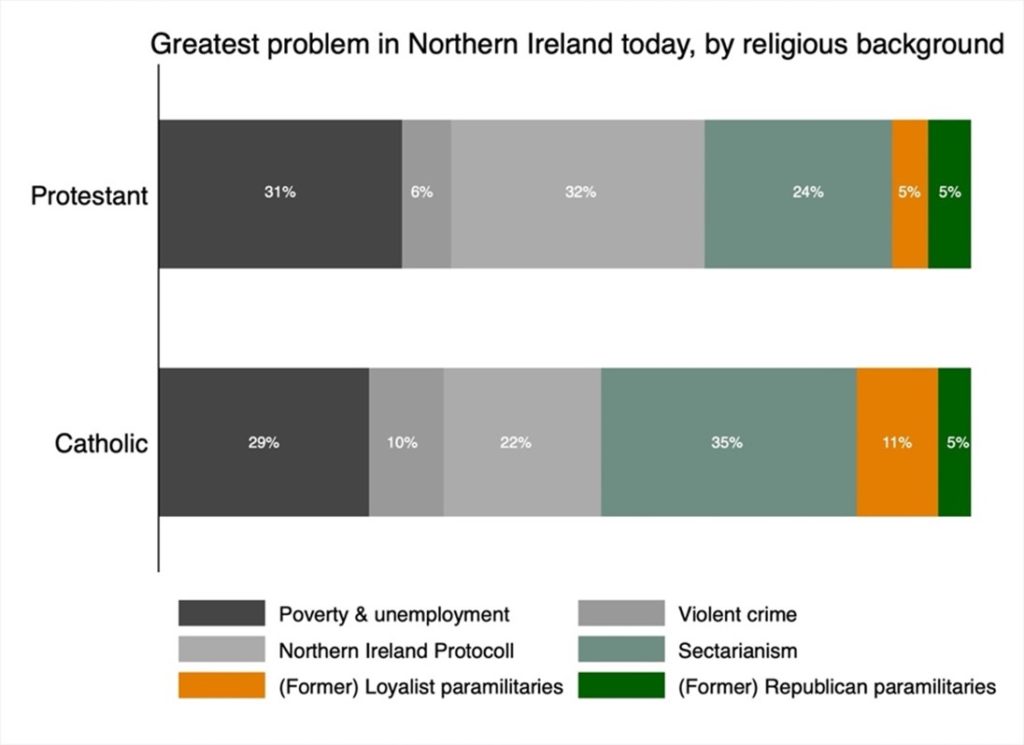
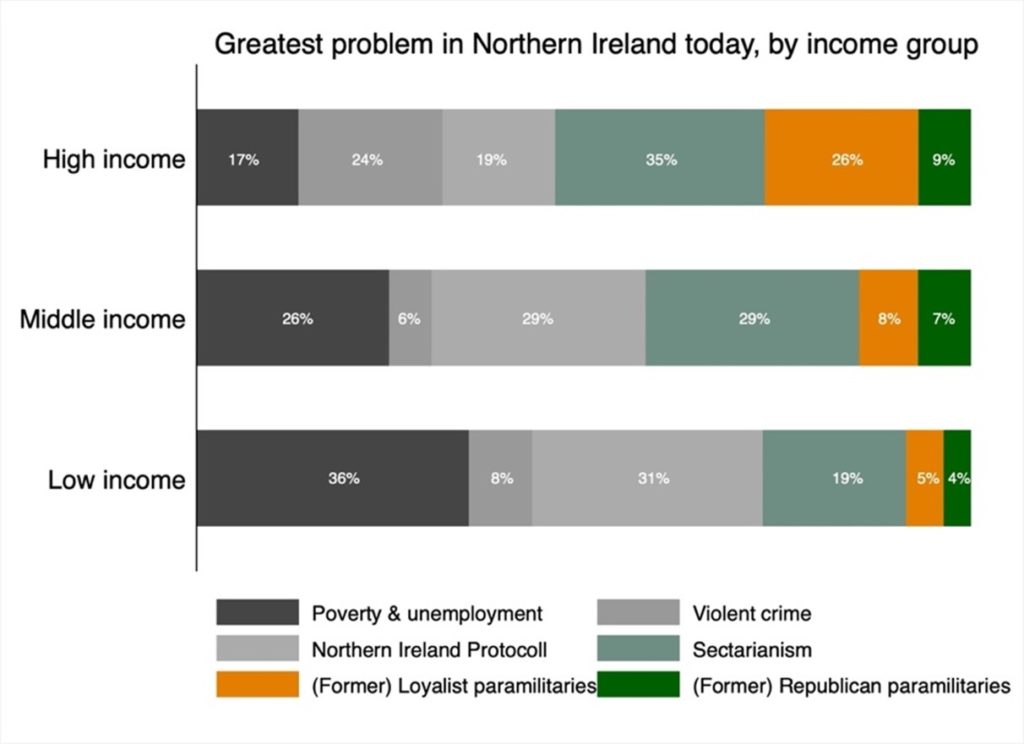
Gendered perceptions of paramilitary groups
The continued presence of Loyalist and Republican paramilitaries is a noticeable feature in post-conflict Northern Ireland. While they are predominantly associated with violence and crime, some view them as a source of security and stability. While our findings show that concerns about paramilitaries were more prevalent among high-income earners, the perception of paramilitaries has a significant gender component. Nearly 50 percent of male Catholic respondents attributed a controlling influence to paramilitaries in their area. And while most of them saw these groups as a source of fear and intimidation, 32 percent agreed that the paramilitaries kept their local area safe. But only 5 percent of female Catholic respondents felt similarly. This difference is not as stark between female and male Protestant respondents. Both groups were substantially less likely than male Catholics to consider paramilitary groups as a source of safety.
Different perceptions of armed groups by gender are not unique to Northern Ireland. A 2014 study on Colombia found significant differences between female and male perceptions of post-conflict politics and participation. Although there were no substantial gender differences in the overall support for the peace process in Colombia, female respondents reported higher levels of distrust and skepticism toward demobilization, forgiveness, and reconciliation and higher disapproval of the political participation of former FARC members. The effect was even greater for mothers and women victimized during the conflict.
The long shadow of war
Violent attacks have dampened the anniversary celebration of the peace agreement and 25 years of relative stability. The recent injury of a police detective by an IRA splinter group, reports of paramilitary-style attacks and the use of petrol bombs against the police, coupled with turf battles between Ulster factions are continuous reminders of the presence and power that paramilitary organizations still hold across Northern Ireland. Even today, communities are kept under siege through violence and ransom. The formal termination of violent conflicts through peace agreements, as in the case of the Good Friday Agreement and other prominent examples such as the 2016 Colombian Peace Accord, does not automatically imply the disbandment of armed organizations. The impact of the presence of (former) armed groups in people’s daily lives continues to be high in most post-conflict contexts.
Findings from surveys in other post-conflict environments mirror this long shadow of war. A study of Croat and Serbian youths showed the continued impact of the Yugoslav Wars on ethnic group identities and how continued communal segregation impacts inter-group ethnic attitudes towards out-groups. A recent study finds that a decade after the civil war in Sri Lanka people from previously warring sides have very different views of peace and security. Respondents who belong to the defeated minority ethnic group, the Tamils, provided a more negative assessment of security and ethnic relations than those from the victorious majority, the Sinhalese. They also reported seeing irregular armed groups in a more protective role rather than a threatening one, when they encountered them, as we show here. And in many post-war countries, it’s the police who threaten peace, as discussed in this post. A study on Liberia found that experiences during the war continued to impact perceptions of the police afterwards. Victims of rebel violence were later more trusting of the police, while victims of state-perpetrated violence were not.
Much research is rightly concerned about how to avoid the conflict trap. Yet even countries that avoid falling back into full-scale civil war oftentimes do not offer adequate security and peace for all groups of their civilian population. Continued vigilance of unequal experiences and perceptions of security are necessary to work towards meaningful and lasting peace.
Sabine C. Carey is Professor of Political Science at University of Mannheim. Marcela Ibáñez is a Postdoctoral Researcher at the Chair of Political Economy and Development at the University of Zurich. Eline Drury Løvlien is Associate Professor at the Norwegian University of Science and Technology, Department of Teacher Education.
This work was supported by the German Research Foundation (DFG) via the Collaborative Research Center 884 “Political Economy of Reforms” at the University of Mannheim.

